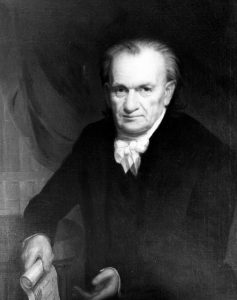 One of the founders of Rensselaer Polytechnic Institute, Amos Eaton, probably doesn’t get sufficient credit for developing new instructional methods relating to the practical application of science, using the radical method of learning by doing, having students experiment and deliver lectures. His initial aim in creating the Rensselaer School was to teach the teachers, and Eaton’s reputation as a speaker on natural philosophy (now the sciences) drew students from distant Pennsylvania and Ohio, as well as closer New Yorkers and New Englanders, to the new institute in Troy. The school was a success from the start. In addition to a number of firsts, such as granting the first civil engineering degrees in the nation, Rensselaer may also have been the first college led by someone who had done hard time: Amos Eaton spent nearly five years in prison for forgery.
One of the founders of Rensselaer Polytechnic Institute, Amos Eaton, probably doesn’t get sufficient credit for developing new instructional methods relating to the practical application of science, using the radical method of learning by doing, having students experiment and deliver lectures. His initial aim in creating the Rensselaer School was to teach the teachers, and Eaton’s reputation as a speaker on natural philosophy (now the sciences) drew students from distant Pennsylvania and Ohio, as well as closer New Yorkers and New Englanders, to the new institute in Troy. The school was a success from the start. In addition to a number of firsts, such as granting the first civil engineering degrees in the nation, Rensselaer may also have been the first college led by someone who had done hard time: Amos Eaton spent nearly five years in prison for forgery.
Eaton was born in Chatham in Columbia in 1776 to a prosperous farm family, and he early on showed an interest in nature and science, performing land surveys at the age of 16. Despite that, after studying natural philosophy at Williams College and dabbling in teaching, he took up the study of law and became a practicing lawyer and land agent, while continuing to develop his knowledge of the sciences, particularly botany.
The “Biographical Record of the Officers and Graduates of the Rensselaer Polytechnic Institute, 1824-1886,” describes Eaton’s progression delicately:
“He was admitted as an attorney of the Supreme Court of the State of New York, at Albany, October 30, 1802, and soon after established himself as a lawyer and land agent in Catskill, N.Y. Here he remained several years, his position affording him good opportunities for cultivating his growing taste for the natural sciences. In May, 1810, he made in Catskill, it is believed, the first attempt in this country at a popular course of lectures on botany (compiling for the use of his class a small elementary treatise,) for which he was highly complimented by his former teacher, Dr. Hosack, as ‘first in the field,’ saying ‘you have adopted the true system of education, and very properly address yourself to the senses and the memory.’ Here we find Mr. Eaton, at this early day, adopting that mode of instruction which rendered him so pre-eminently successful in inspiring young men with that enthusiasm which assured success.
Owing to a concurrence of circumstances which our limits will not allow us to explain, Mr. Eaton now found his love for the details of his profession diminishing, and his interest in the natural sciences fast growing upon him; and he therefore resolved to abandon the practice of the law, and prepare himself to become an efficient laborer in the congenial pursuits of science.”
So, a thing happened that diminished his love for the details of his profession. That thing was prison. Every web source reports it pretty much the same way: while working as a land agent and surveyor in Catskill in 1811, some form of a land dispute resulted in Eaton being imprisoned for forgery for nearly five years. He was accused by a client of having forged a property release; some articles suggested that it was somehow a political frameup (although there’s little other evidence of any political activity on his part) and that he received less than a fair trial. A review of an Eaton biography in the Knickerbocker News in 1941 says that he served more than four years at Newgate state prison in Greenwich Village, New York City, and that he had received a conditional pardon from Governor Tompkins in 1815 before being fully pardoned by Governor DeWitt Clinton in 1816 (or perhaps 1817). In the conditional pardon, he was exiled from New York State, so he studied botany and mineralogy at Yale College starting in 1815, and then went back to Williams College in 1817 as a lecturer. In 1818, came back to New York, started touring around as a visiting lecturer, and assisted in creating the Troy Lyceum of Natural History.
He then connected with Stephen Van Rensselaer, who engaged him in an agricultural and geological survey of Rensselaer Manor, and that led to a geological survey of the route of the Erie Canal, where he was assisted by a young Joseph Henry. Eventually, Eaton raised the idea of creating a new kind of school to the Patroon, where Eaton would train students in the application of science to the common purposes of life. And the Rensselaer School was born, in 1824.
(There is an article that may explain the DeWitt Clinton and Amos Eaton connection, if you’re a subscriber to the Journal of American History or you have a spare $40 lying around to view it for one day.)
